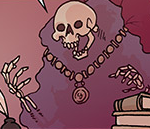|
thefakenews posted:This sound like a hack for Blades in the Dark. It already has a structure around acquiring holdings, and reputation with other factions/gangs. a cyberpunk hack was unlocked as a reward for the Blades kickstarter, though the pitch is for more of a covert game about combating secret AI masters of the world. If it ever shows up it could be a good baseline at least. Blades in the Dark also had a "Bluecoats of the Watch" playable gang type reward unlocked, which has been noted as being worked on, so I'm curious how that will turn out Nuns with Guns fucked around with this message at 05:22 on Jan 18, 2017 |
|
|
|

|
| # ? May 13, 2024 22:14 |
|
Well, having gotten a response from DriveThruRPG to offer prizes, the February Trad Games Design Contest thread is live! Feel free to sign-up and suggest ideas for Anime Genres for me to draw from. I already have 9, but more would make it more interesting. Also, DTRPG offered to up the available prizes based on how many people enter. So enter already, and prove that you're better than Guardians of Order and Studio Gonzo.
|
|
|
|
SunAndSpring posted:I made a thread for it and nobody posted in it and that made me feel sad and bad. Where? I would post there. Also, looks like there hasn't any new big F20 games since most of the answers to that questions were the sames one from a while ago. Shouldn't be that surprised as, while many come out, most are bad. TheSoundNinja posted:Well, having gotten a response from DriveThruRPG to offer prizes, the February Trad Games Design Contest thread is live! Feel free to sign-up and suggest ideas for Anime Genres for me to draw from. I already have 9, but more would make it more interesting. Also, DTRPG offered to up the available prizes based on how many people enter. Entered. Guardians of Order? More like Guardians are poorer B-because I'm better at this than them. Which I will prove through the entry. To the contest. Of which I applied. Uh...
|
|
|
|
I do like the first post complaining about playtesting like its some mad new idea and not a rule almost every TG contest has had.
|
|
|
|
Covok posted:Also, looks like there hasn't any new big F20 games since most of the answers to that questions were the sames one from a while ago. Shouldn't be that surprised as, while many come out, most are bad. As far as "new hotness", a number of us (including you, didn't Libertad! host that oneshot?) are enthusiastic about Shadow of the Demon Lord, although that doesn't use a d20. And then there's also Godbound, but it's somewhat more "high-powered" than "standard F20"
|
|
|
|
Covok posted:Where? I would post there. Well I specifically left out stuff from the OSR movement as most of that is pretty different than what most people think of when someone says Fantasy D20 system
|
|
|
|
Mr. Maltose posted:I do like the first post complaining about playtesting like its some mad new idea and not a rule almost every TG contest has had. As someone who ran one of those contests, much easier, by the by, to get people to do it for each other. Because, oui, can it be a pain if you, the contest holder, do it all your own with your own group. Takes a while and your players might get annoyed at you. gradenko_2000 posted:As far as "new hotness", a number of us (including you, didn't Libertad! host that oneshot?) are enthusiastic about Shadow of the Demon Lord, although that doesn't use a d20. Ah, right, yeah, those games. Though, to be honest, while it was a fun one shot, I don't get the hotness for SotDL.
|
|
|
|
Mr. Maltose posted:I do like the first post complaining about playtesting like its some mad new idea and not a rule almost every TG contest has had. https://www.youtube.com/watch?v=gRdfX7ut8gw
|
|
|
|
Shadow of the Demon Lord absolutely uses a D20. I wouldn't consider it a "F20" game as such, but the D&D/D20 DNA is very apparent in the design.
|
|
|
|
It's a good one, too. If you can't find some people on TG to play anime games there's a problem.
|
|
|
|
I'm also not feeling the hype for SotDL. So far it just looks like "grimdark D&D with a better rule set."
|
|
|
|
Simian_Prime posted:I'm also not feeling the hype for SotDL. So far it just looks like "grimdark D&D with a better rule set." I have to agree. I checked it out based on all the enthusiastic responses it seemed to be getting here and wasn't incredibly impressed with my admittedly brief look through the corebook. My admittedly extremely shallow sniff test for a D&D-alike is "how rad does the Fighter-equivalent" look and the SotDL Fighter didn't look very rad to me, so oh well.
|
|
|
|
isn't D&D with a better rule set kind of the point? I mean yeah you could play in another setting/subgenre but then good rulesets for those then do already exist as well.
|
|
|
|
I think the goal is more "Warhammer Fantasy-alike with a better ruleset," the way the careers are set up. Like one of the random 'interesting items' you can start with is literally a small but vicious dog. That's why you don't even start with a class, exactly, just a profession.
|
|
|
|
I want to PLAY the small and vicious dog.
|
|
|
|
gradenko_2000 posted:isn't D&D with a better rule set kind of the point? I mean there's a convincing argument that 13th Age is "D&D with a better rule set" but I still find it pretty dull tbh.
|
|
|
|
Simian_Prime posted:I'm also not feeling the hype for SotDL. So far it just looks like "grimdark D&D with a better rule set." It's a solid work that isn't totally revolutionary, but works well for what it is. The insanity rules, class system and boons and banes are good systems. I like the grimdark flavor in most cases, even if it doesn't give you much room to actually affect the world. I'm not really down with a lot of it, like it's bad use of grossness as a horror element, the fast/slow turn system or grid combat in a horror game, but it's a decent 7/10 Mr. Maltose posted:I do like the first post complaining about playtesting like its some mad new idea and not a rule almost every TG contest has had. It is a pretty bad idea unless you know how to drag my group away from their campaign to try an untested game based on a genre and medium they don't like, by someone they've never met. I haven't seen an RPG competition that needed as much effort as this one, and this is supposed to be a joke challenge on a small forum with some $20 gift vouchers. If you go to heavy with rules and poo poo it'll go the same way as every other rules-bloated forums competition: It'll be too annoying to actually organise and nobody will sign up. Wrestlepig fucked around with this message at 00:29 on Jan 19, 2017 |
|
|
|
SotDL is rad because the rules system is relatively lightweight and the character customization is really cool and in-depth. The tight structure that Schwalb proposes for a campaign doesn't really appeal to me, but it can help people avoid neverending campaigns. But what really draws me in is that is nails the tone it wants to convey, which is basically Dark Souls but more than just one person. I normally wouldn't touch most d20 stuff these days, but this game has seriously impressed me.
|
|
|
|
Simian_Prime posted:I want to PLAY the small and vicious dog. Have you heard the good news about corgi homebrews?
|
|
|
|
rumble in the bunghole posted:
You do realize this makes you sound like a fool, right? Every TG contest that has been successful that I'm aware of has had the playtest requirement. Playtesting is part of design, actually playing a work helps you find issues and edge cases you wouldn't think of because everybody is a little bit different. Being exposed to other people's works makes you a better designer. Trying out genres you're unfamiliar with helps you grow your GM skills. If you don't want to do that, too bad, don't sign up. Just don't go complaining about it.
|
|
|
|
rumble in the bunghole posted:It is a pretty bad idea unless you know how to drag my group away from their campaign to try an untested game based on a genre and medium they don't like, by someone they've never met. I haven't seen an RPG competition that needed as much effort as this one, and this is supposed to be a joke challenge on a small forum with some $20 gift vouchers. If you go to heavy with rules and poo poo it'll go the same way as every other rules-bloated forums competition: It'll be too annoying to actually organise and nobody will sign up. There are four rules and I personally posted in the contest thread that I will put together a group and run any qualifying Japanese animation simulation. Much like every other TG contest with that rule, you don't actually have to use your personal group of bosom buddies in a ten month campaign to test all edge cases. Somebody, anybody just needs to kick the drat thing's tires.
|
|
|
|
Mr. Maltose posted:There are four rules and I personally posted in the contest thread that I will put together a group and run any qualifying Japanese animation simulation. Much like every other TG contest with that rule, you don't actually have to use your personal group of bosom buddies in a ten month campaign to test all edge cases. Somebody, anybody just needs to kick the drat thing's tires. Yeah. Playtesting is tough for a lot of us to do, but absolutely the rule is a good one. (I may bug you about playing my thing, cuz your offer is very generous and awesome and helpful)
|
|
|
|
Something in the Kickstarter thread made me start thinking about stuff, namely using GM screens to hide your rolls and it made me think about my own experiences and how I personally do it. Like, I've gamed with GMs who insisted on rolling absolutely everything behind the screen, including attack rolls and damage, because they felt it was better for immersion. Personally I'm not a fan of this approach: part of it has to do with the fact that I actually enjoy rolling the dice myself and I think actually getting to engage with the actual mechanics of the game (both as a player and a GM) is the best part of the game, not to mention that this approach really doesn't work in games where players have the ability to trigger rerolls or otherwise manipulate their rolls. Not only this, but playing with this style feels like I always need to be reminding the GM of all the various abilities I have on my character sheet: "Did you remember to add +1 because I'm fighting goblins? And +2 because I'm in my goblin-slaying stance? And +3 because it's Tuesday?" Not only that but I just don't like hiding my rolls from players at all. None of my rolls. Even stuff like surprise rolls, wandering monster checks, and so on. I won't always telegraph right away what the roll is for, but I feel it's only fair that my players actually see me rolling the dice in front of them, and rolling stuff like monster attacks and damage in front of them reinforces the feeling that we're playing by the same rules and I'm not fudging things either in their favor or against them. I know some people rail against letting players roll stuff like Perception checks and stuff to notice things because it leads to metagaming. Personally, though, I think rolling to see if you see a thing is the worst example of the sort of need to codify everything into the rules that leads to lovely games, but in addition to that rolling stuff like that in secret from the players leads to a whole new kind of metagaming ("Okay, we can't be sure if our failure to notice anything out of the ordinary in this room was on account of there being nothing out of the ordinary ordinary or the GM rolling badly on our Perception checks, so just to be sure let's search the room again in case we missed something.") which I feel is much worse for the flow of the game than "Well, I know I hosed up that Perception test so I might as well try again." I know this is a really bad example since I just railed against Perception checks. I haven't found a perfect answer to how stuff like that should be done, but my preferred approach has been to tell players exactly what they see, let them ask follow-up questions should something in particular about the scene interest them, and stuff like Perception or an elf's ability to detect secret doors or a dwarf's familiarity with construction just act as ways to give them information that's not plainly visible in the scene. For an example, I might describe to the players a room with a bookcase. If one of my players plainly asks me "Is one of the books actually not a real book but a switch that opens a secret door?" I'll tell them "Well, now that you look at it, yeah, it is." If there was an elf in the group upon describing the bookcase I'd ask them to roll to detect secret doors and were they to succeed tell them "Oh, and the elf notices a draft coming from the direction of the bookcase, there's clearly a secret door behind it." Or if it was the dwarf who made the test, it'd be "There's something distinctly strange about the architecture of the room, the placement of the bookcase clearly clashes with your sense of dwarven feng shui, almost as if it'd been placed there simply to hide something." I know it's not a perfect approach, but it's been good enough for me. What's everyone else's preferred approach to players rolling vs. GMs rolling, and keeping rolls hidden vs. rolling in the open?
|
|
|
|
I roll absolutely everything out in the open. For Perception checks, it's something like: "Roll Perception" *player gets a 2* "You don't really see anything of interest" and we keep playing. They can assume all they want that there's something there, but the dynamic I'm thinking of is kind of like how an actor in a horror movie intellectually knows that the monster is in the closet, because they read it in the script, but because they know it's there, they play along with it all the more. Pretty much everyone I've played with ends up doing this without me having to explicitly declare it. "Derp, I can't see" and they move on or try something else. I also don't like the concept of "fudging rolls". As a DM, I am already the sole arbiter of what a roll means, once it hits the table. I don't need to undermine my own credibility when I say that the 5 doesn't actually mean a 5. I can pull my punches, or make the NPCs target someone else, or make the penalty for failure significantly milder, but if the player rolls something that they expect is a failure, that actually is a failure per the rules, I think it's overall better to the integrity of the experience to continue maintaining that it actually was a failure, even if the landing isn't very hard. Either that, or admit that I made a bad DMing call, rather than retconning the world to adapt to my mistake.
|
|
|
|
Man, I'm used to games where the GM doesn't even bother to hide stuff like monster stats because it's quicker and easier to just let the players go "okay I need to roll 7 or higher, nailed it, they take X damage" and keep things moving briskly. I'm not like morally opposed to keeping information hidden or anything but a lot of the time it feels pretty pointless, especially with dice rolls and stuff. I'm also not a huge fan of the oft-cited "randomly make a nothing roll whenever the PCs do something and make thoughtful noises about it in order to keep them paranoid" business either, which seems to be something that always gets brought up whenever hidden rolls do, like if you want to talk about poo poo that'll bog a game down nothing does it faster than pretend-rolls to "keep the players guessing" that does, in fact, keep them guessing to the point that it derails whatever was going on. Admittedly I'm not, and never have been, a big "immersion" person, so a lot of the stuff that always gets touted as more immersive always strikes me as pointless fetishism.
|
|
|
|
Kai Tave posted:Man, I'm used to games where the GM doesn't even bother to hide stuff like monster stats because it's quicker and easier to just let the players go "okay I need to roll 7 or higher, nailed it, they take X damage" and keep things moving briskly. I'm not like morally opposed to keeping information hidden or anything but a lot of the time it feels pretty pointless, especially with dice rolls and stuff. I'm also not a huge fan of the oft-cited "randomly make a nothing roll whenever the PCs do something and make thoughtful noises about it in order to keep them paranoid" business either, which seems to be something that always gets brought up whenever hidden rolls do, like if you want to talk about poo poo that'll bog a game down nothing does it faster than pretend-rolls to "keep the players guessing" that does, in fact, keep them guessing to the point that it derails whatever was going on. Real Immersion would be hiding all the dice and mechanics from the players for what would then be improvised theater. To be fair, a lot of GMs (and PCs!) could learn from improv. That aside, like most things in life, my position on hidden dice rolls and mechanics has varied as I aged. These days, unless there's a good reason to hide that information (usually damage rolls in the first 1-2 rounds of combat) I see no point in doing so. For the parenthetical, it's simply because I have had PCs who somehow had the worst luck that also inexplicably worked through me when rolling damage, to the tune of "How many HP did you have? Oh, um, you're..." and then dead, unconscious, bleeding out, gravely wounded, whatever the worst state your character could end up in after a single roll in the system in question. Since I'd rather people not get taken out of combat sometimes before they even get a turn, I will fudge damage for those poor unfortunate souls.
|
|
|
|
gradenko_2000 posted:I also don't like the concept of "fudging rolls". As a DM, I am already the sole arbiter of what a roll means, once it hits the table. I don't need to undermine my own credibility when I say that the 5 doesn't actually mean a 5. Kai Tave posted:Man, I'm used to games where the GM doesn't even bother to hide stuff like monster stats because it's quicker and easier to just let the players go "okay I need to roll 7 or higher, nailed it, they take X damage" and keep things moving briskly. I'm not like morally opposed to keeping information hidden or anything but a lot of the time it feels pretty pointless, especially with dice rolls and stuff. I'm also not a huge fan of the oft-cited "randomly make a nothing roll whenever the PCs do something and make thoughtful noises about it in order to keep them paranoid" business either, which seems to be something that always gets brought up whenever hidden rolls do, like if you want to talk about poo poo that'll bog a game down nothing does it faster than pretend-rolls to "keep the players guessing" that does, in fact, keep them guessing to the point that it derails whatever was going on. Yeah, same here. I tend to be really transparent about what players need to roll. "Roll to hit. Did you hit an AC of 7? Good, roll for damage." I tend to run systems that have fixed difficulties instead of sliding DCs these days, so even outside of combat it's as simple as "Roll under Strength," or something, so my players immediately see if they failed or not. It's been a long while since I've used a system that has sliding difficulties, but were I to do so again I'd also make sure to telegraph the difficulties to my players before they roll. But also the consequences of a failure or a success.
|
|
|
|
I'm also generally in favor of full info on monster stats, or at least not playing headgames like "you rolled a 23? Uh-huh, that's a hit" but still not saying exactly what the AC was. There's also something to be said about systems that don't ask you to rear end-pull a DC except if you want to make it exceptionally hard or exceptionally easy.
|
|
|
|
This does remind me of one time I had a GM hide the mechanics from us (in part) to great effect: while playing a Delta Green scenario our GM kept track of our Sanity scores instead of allowing us to keep track of them. However, the particular scenario had the idea that the more Sanity the characters lost the more vivid hallucinations and supernatural effects the characters began to experience. Since we were playing according to all the stupidest horror movie tropes we spent quite a lot of the time split up, which meant that we as players didn't know whether the supernatural poo poo we were seeing was actually real or just the consequence of our characters going crazy. That was actually the one and only horror game I've played in that was actually, seriously scary to me, and I can say that horror might be the one genre where I would actually be down for keeping some of the mechanics hidden, because horror itself relies on the fear of the unknown. But were a GM to pull similar poo poo with hit points in D&D would be some bullshit like in that one dumb Jurassic Park FPS where you didn't have a health bar but had to check your character's body to see how badly hosed up you were.
|
|
|
|
I always roll everything out in the open and don't really see the point of a GM Screen unless you need big pages of stats and secrets out in front of you to run your game - or you're playing 1970s D&D and you've got the actual map in front of you that they definitely shouldn't be allowed to see. For me, hiding rolls is pointless because the only purpose behind it is to be able to fudge rolls, which is lying to your friends imo. Ratpick posted:What's everyone else's preferred approach to players rolling vs. GMs rolling, and keeping rolls hidden vs. rolling in the open? To specifically talk about your Perception check topic, I'm not an enormous fan of describing the room and requiring the players to, for example, specifically check the bookcase to find the secret door. What I don't want to end up happening is the classic A4 page of standard operating procedures for entering a new room that the players just go down because it's the best way to ensure they safely find everything. I like immersion in my games, but I've seen people on the internet make fun of people who say 'I roll a Perception check' and I think that's dumb because to me that indicates the person is not that interested in searching the place and wants to move on. For me, I always end up using the litmus test of 'is the task difficult enough to roll for?' Whether that task was 'I search the whole room thoroughly' or 'I start pulling books looking for a secret door', those tasks might be easy enough that they just find whatever it is that's there to be found. On the other hand, either of those tasks might actually be difficult enough to require some sort of roll - maybe the hidden desk draw is especially well hidden, such that a normal thorough search wouldn't find it, or maybe the book switch has a couple of other arcane steps required to actually activate it. I guess in D&D this would be Taking 10 or Taking 20 on a Perception check, mechanically. A friend of mine has the whole party roll out a half dozen Perception checks each at the start of the session and checks them off as they use them, partly to speed things up and partly so that they don't necessarily know they're making them for ambushes and stuff.
|
|
|
|
Fudging rolls isn't always a bad thing, unless you've agreed to play some kind of hard simulationist thing and it would ruin the integrity of the whatever.
|
|
|
|
Doodmons posted:To specifically talk about your Perception check topic, I'm not an enormous fan of describing the room and requiring the players to, for example, specifically check the bookcase to find the secret door. What I don't want to end up happening is the classic A4 page of standard operating procedures for entering a new room that the players just go down because it's the best way to ensure they safely find everything. I like immersion in my games, but I've seen people on the internet make fun of people who say 'I roll a Perception check' and I think that's dumb because to me that indicates the person is not that interested in searching the place and wants to move on. These are all really good points and I do understand that having players meticulously describe the procedure of looking for secret doors eventually becomes stale. I actually agree with you but I think it's a testament to how bad my example was that I didn't get my point across entirely. Basically, if my players describe that they do a thing, then they do the thing. The character who describes inspecting the bookshelf to see if one of the books is actually an opening mechanism for a secret door, then they do it. However, even if they don't have a specific clue as to what they're looking for, they can always fall back on the dice. To be honest, my actual beef isn't with Perception checks, it's the use of Perception checks to gate off valuable information or parts of the adventure from the players. Like that one podcast from the D&D 5e playtest where the group spent multiple minutes stuck in a room because they couldn't succeed at the check to find the secret door, and they'd already explored all the other branches of the dungeon. That's dumb. But another type of bullshit is hiding information from players and making finding it reliant on a Perception check. If the characters are investigating a crime scene and you make finding each clue reliant on a Perception check you're just making a puzzle where the players have to roll the dice to see how many pieces they get, when the real challenge of a puzzle is putting all the pieces together. But yeah, as I said, the dice are always a fallback that the players have access to: I would never do dumb poo poo like "Well you didn't describe exactly how you were poking each floor tile with a ten foot pole or that you actually had your eyes open so of course you didn't notice the trap" to my players. I like to think that I telegraph my traps pretty well (if there have, thus far, been no carpets on the floor in the dungeon, the sudden appearance of a carpet on the floor is a pretty good sign that something, whether a pit trap or a secret door, is hidden under it) and most of the time my players can just say "Yeah, okay, we avoid the obviously placed trap," but even when they fail to notice me signaling traps to them I assume that their characters are smart enough to always be on the lookout for traps, which basically gives them a last chance roll to see if they notice the trap right before they trigger it. Anyway, that litmus test of yours is really good and it's something that I should actually keep in mind more often. A lot of the time we just skip to the "roll the dice" part of action resolution before we've even thought about whether the thing merits a roll and what the actual consequences of success and failure are. e: Pope Guilty posted:Fudging rolls isn't always a bad thing, unless you've agreed to play some kind of hard simulationist thing and it would ruin the integrity of the whatever. Like, back in the day when my friends and I still played D&D 3e I'd be constantly fudging rolls for my friends to make sure they survived the first couple of levels, because making new characters in that game was a pain in the rear end. Since then I've realized that I'd rather run something like 4e (less swingy and deadly at low levels) or Basic D&D (much less complex so creating a new character is quick) because I don't have to fudge rolls in either to get a desireable experience (although those two systems lead to very different experiences). Ratpick fucked around with this message at 14:49 on Jan 19, 2017 |
|
|
|
My DMing has been heavily influenced by listening to hours and hours of Trail of Cthulhu and Nights Black Agents APs, and I'm an advocate of the whole "just tell them the loving clue" approach. You enter the room, and I give you the lede. The interaction may be driven by the dice, and maybe there's a Perception check to see how much more extra information you have, but I have an elemental dislike of the players needing to "pixelbitch" just to begin the process of interacting with the environment. Or to put it another way: even if you told the players everything, all the time, there's still a lot of room left over for dice rolling and failures based on what they do with the information.
|
|
|
|
gradenko_2000 posted:My DMing has been heavily influenced by listening to hours and hours of Trail of Cthulhu and Nights Black Agents APs, and I'm an advocate of the whole "just tell them the loving clue" approach.
|
|
|
|
I just like Mike Mearls style where you keep rolling Wisdom checks until someone makes it
|
|
|
|
Ratpick posted:Basically, if my players describe that they do a thing, then they do the thing. The character who describes inspecting the bookshelf to see if one of the books is actually an opening mechanism for a secret door, then they do it. However, even if they don't have a specific clue as to what they're looking for, they can always fall back on the dice. Agreed 100%. Dice rolling is for when the outcome of the roll is both uncertain and interesting. Ratpick posted:I don't think fudging rolls is necessarily a bad thing, but I'm of the opinion that if a GM has to fudge rolls constantly to make the game's events match a more desireable outcome (for them) then they're probably using the wrong system for their game. Possibly this is my inherent bias but I tend to find that people who play a lot of D&D fudge dice rolls a lot more because a single d20 roll is incredibly swingy and D&D often has very serious consequences for failing single rolls. I tend to play systems that are either less swingy (dice pool or multidice systems, usually), have some way to mitigate failures of critical rolls or simply have less serious consequences for failing rolls. Examples: GURPS is a 3d6 system where a quick trip to anydice will tell you that fully half of your rolls will be in the middle 9-12 range. Wild variation is statistically unlikely. Blades in the Dark has very serious consequences for failing rolls - getting anything but a full success on a desperate roll can lead to your character being instantly killed. However, any consequence in the game can be resisted for 0-5 Stress if you don't want to take it. Spellbound Kingdoms lets you spend 1 Mood after you roll to just maximise the die. It's impossible to die permanently in Tenra Bansho Zero unless you voluntarily tick the Dead Box on your health track in exchange for massive dice bonuses With a decent size dice pool in WoD you're rolling so many dice that the probability curve tends to flatten out. I guess when you get to higher level D&D and your modifiers start outstripping your dice roll massively things get less swingy, but there's still going to be a potential variation of +/- 19, any of which is equally likely. It was when I was playing through Horde of the Dragon Queen in D&D 5th and there's a bit early on where the party are sneaking into a war camp and everyone has to make a DC 5 Stealth check or something. The success of the whole party is basically required to a) avoid a TPK and b) advance the plot. They set it at DC5 going "oh ho ho what a laughably easy check to pass" when actually the chances of the whole party passing are surprisingly small. The odds of at least 1 person failing in a party of 4 is 60% (assuming no modifier, and for the sake of argument I'm assuming the high-modifier characters cancel out the negative modifer ones) and that's if you exclude having disadvantage from wearing heavy armour - which like half our party were wearing. I haven't played further into the adventure but apparently there's a similar thing later on where you're being accused of a crime and get separately interrogated. You all need to pass a Bluff check or you get executed - same story, odds are that's a TPK because you just can't guarantee people will pass die rolls in a single d20 system. In some ways that's part of the draw of D&D, I suppose. The high level of randomness keeps things interesting and provokes cool stories. You're never absolutely outmatched because you can always just roll really well even against incredible opposition and that feels good. Even stories where someone rolls dismally are still fun to tell. In WoD, for example, if someone has better stats than you then you're basically dead barring some extremely unlikely rolling or serious hustling. I actually really liked the dice system that one of my friends came up with for a homebrew: you were trying to roll underneath your stat number by adding up a pool of d6s, and the difficulty of the check was how many d6s you rolled. If you rolled three 1s it was a crit success and three 6s was a crit failure regardless of the rest of the dice. The probability curve on regular rolls was very steep so you could be very confident in what you could expect to roll, but there was the increasing probability of insane, unlikely critical failures or successes on difficult checks to keep things interesting. Most rolls were predictable, which kept things satisfying and sensible, but there was a reasonable and ever-present chance of craziness which kept things interesting.
|
|
|
|
Doodmons posted:In some ways that's part of the draw of D&D, I suppose. The high level of randomness keeps things interesting and provokes cool stories. You're never absolutely outmatched because you can always just roll really well even against incredible opposition and that feels good. Even stories where someone rolls dismally are still fun to tell. D&D, particularly old school "fantasy loving Vietnam" D&D, definitely pushes the same buttons as XCOM, particular the original 90s XCOM, wherein you take a bunch of randomly generated characters out into the wilderness and procedurally generate a narrative from their trials and tribulations. On the flipside, more modern RPG design tends to echo the more recent XCOM games, where you can and should take guaranteed rolls, and the tension comes from the limited number of opportunities (read: ability uses) where you can force a good roll, or the difficulty of setting a situation that will create a good roll (as in flanking, et al)
|
|
|
|
One reason to always let players know enemy hp: when they do a roll and see theyve killed it, they can describe the totally kickass way their character shut that dude down. As a player and gm I live for that poo poo.
|
|
|
|
Error 404 posted:One reason to always let players know enemy hp: when they do a roll and see theyve killed it, they can describe the totally kickass way their character shut that dude down.  Although I generally tell the players how badly they overkill and then have them describe it if they so desire.
|
|
|
|

|
| # ? May 13, 2024 22:14 |
|
Doodmons posted:I guess when you get to higher level D&D and your modifiers start outstripping your dice roll massively things get less swingy, but there's still going to be a potential variation of +/- 19, any of which is equally likely. It was when I was playing through Horde of the Dragon Queen in D&D 5th and there's a bit early on where the party are sneaking into a war camp and everyone has to make a DC 5 Stealth check or something. The success of the whole party is basically required to a) avoid a TPK and b) advance the plot. They set it at DC5 going "oh ho ho what a laughably easy check to pass" when actually the chances of the whole party passing are surprisingly small. The odds of at least 1 person failing in a party of 4 is 60% (assuming no modifier, and for the sake of argument I'm assuming the high-modifier characters cancel out the negative modifer ones) and that's if you exclude having disadvantage from wearing heavy armour - which like half our party were wearing. I haven't played further into the adventure but apparently there's a similar thing later on where you're being accused of a crime and get separately interrogated. You all need to pass a Bluff check or you get executed - same story, odds are that's a TPK because you just can't guarantee people will pass die rolls in a single d20 system. Stories that boil down to "one time I rolled really good/bad" are the TRPG equivalent of "man I had the weirdest dream last night, lemme tell you all about it." Also dice rolling should be for when the outcome is uncertain and interesting, I agree. "Everybody keep making skill rolls until one of you fails WHOOPS you all died" isn't very interesting though, is the problem.
|
|
|

























